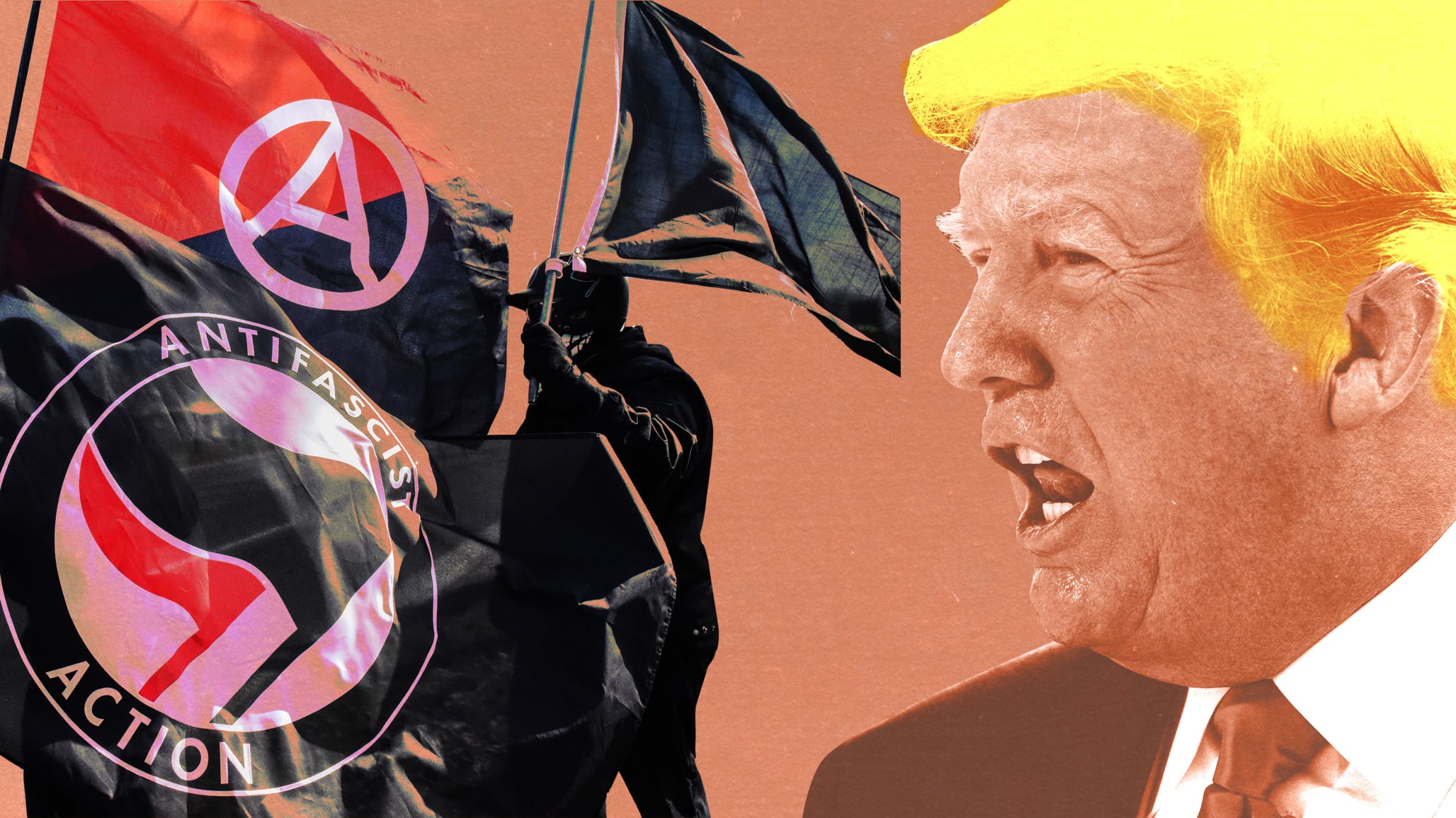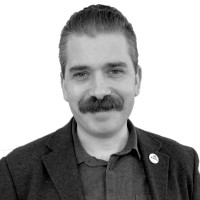Trump’s ‘ANTIFA’ Threat Is Total Bullshit—And Totally Dangerous

Photo Illustration by Lyne Lucien/The Daily Beast/Getty
Amid chatter about outside agitators, a top-down federal attack on left-wing activists could unleash new violence.
It’s not a real organization, “ANTIFA.” And even if it were, there is no such thing as a domestic federal terror designation.
But President Donald Trump’s tweet that the U.S. “will be designating ANTIFA as a Terrorist Organization” is a very real threat.
Trump’s Sunday offering came as federal and local authorities across the country scrambled to contain increasingly violent protests in the wake of George Floyd’s death at the hands of police in Minneapolis. Trump, who over several years has launched numerous tirades against anti-fascists, blamed the movement—really, a set of organizing tactics—for vandalism at the protests.
Although he has previously threatened legal action against anti-fascists (“ANTIFA,” in his preferred Twitter styling), the tweet was followed by a statement from Attorney General William Barr claiming that “violence instigated and carried out by Antifa and other similar groups in connection with the rioting is domestic terrorism and will be treated accordingly.”
Veteran FBI agents and Homeland Security analysts immediately called the “terrorism” label little more than a cynical maneuver to encourage police violence at antiracist demonstrations that have increasingly been labeled the work of nefarious outsiders.
“Why the strong rhetoric directed at antifa when you haven’t come out and condemned white supremacists as domestic terror groups?” said Daryl Johnson, a former DHS analyst stifled during the Obama administration for warning about far-right extremism.
“Anti-fascist” is, among many things, an adjective, not a group. The term can apply to people who personally object to fascism—a large segment of the American populace—as well as people who actively oppose fascism as part of several localized groups across the country.
There is, however, no centralized organization.
“Anti-fascism consists of a variety of different actors and actions,” said Stanislav Vysotsky, an associate professor of sociology at the University of Wisconsin—Whitewater, and author of a forthcoming book on the subject. “Those can be informal: any kind of practice that opposes fascism, and can be taken on by individuals, or they can be formal, which are based in affinity group structures. There’s no formal organization, but there are people who organize as anti-fascists in order to oppose fascist activity.
Sarah Smith, who spoke to The Daily Beast under a pseudonym for fear of reprisal, is a member of Atlanta Antifascists, one of those organized groups. She said the broad usage of the term “anti-fascist” leads to right-wingers conflating everyone from members of organizations like hers, to “anybody who says anything bad about Nazis, for example.”
She added that groups like hers are often accused of being much further-reaching than they actually are. “If a right-winger stubs their toe, it’s ‘oh no, it’s antifa.’ At a certain point, we’ve got a little inured to it,” she said. “But what Trump is saying is going to increase that trend of blaming us for everything people don’t like, even though our mission is very specific. We really do what we say we do: we monitor the far-right locally.”
Just as “ANTIFA” doesn’t exist in the sense that Trump pretends it does, neither does an official “domestic terrorism” label for groups inside the United States. Only the domestic adjuncts of foreign terrorist organizations fall under the rubric of “designated” terrorist organizations, as so labeled by the State Department. Moreover, the chief investigative and prosecutorial tools against such designated organizations are material-support statutes, designed to choke off the flow of money into banned groups. Antifa, which is not an organization, simply does not work that way.
But that doesn’t mean federal and local agencies won’t take action against anti-fascists in an attempt to comply with directives from Washington.
The FBI declined to comment Sunday on what “counterterrorism” measures it would take against anti-fascists. Barr, in a statement after Trump’s tweet, pledged to use the FBI’s Joint Terrorism Task Forces, which combine state, local and federal law enforcement, to “identify criminal organizers and instigators.”
Mike German, a former FBI special agent who disrupted neo-nazi organizations in the 1990s, suggested Trump was making antifa into a scapegoat even as more nefarious right-wing actors were lurking on the periphery.
“It seems to be an effort to distract from the documented presence of white supremacist militia groups at these protests and their rhetoric in wanting to instigate further violence that would potentially flow into a civil war or a race war,” he told The Daily Beast.
But experts said that, however pre-textually, Trump and Barr’s directives pose real dangers to protesters.
DHS’ Fusion Centers, information hubs to state and local law enforcement, can run database checks and put out notices for local cops to monitor known or suspected criminals who might be protesting. German said he expected high-level pressure on the FBI and JTTFs to result in “aggressive investigation and selective prosecution against people the FBI labels with this umbrella term” of anti-fascist—resources he expected would flow out of investigations of violent white supremacist or militia groups. The DHS did not immediately return a request for comment.
Adding to the potential for harm is that, while more experienced activists may take measures to protect themselves from scrutiny, casual opponents of fascism might not, Smith, the Atlanta anti-fascist noted.
“We don’t have any [membership] dues, we don’t use real names. There would be nothing to make illegal,” Smith noted. “If the government is coming after us, it probably won’t affect us as much as it would normal people who are engaged in normal, anti-fascist things.”
Vysotsky echoed Smith’s concern that an effort to target anti-fascists could affect “any organization or individual that aligns left of fascism. It opens up a huge space to designate virtually any person who opposes any kind of authoritarian movement toward fundamental inequality and violence as being a terrorist.”
That includes many of the thousands protesting racism and police brutality in the wake of Floyd’s death.
Welcome to the club, says the group New York City Antifa.
“For a lot of inexperienced folks who haven’t engaged in activism much before, the realities of the police state and surveillance apparatus can be shocking or incredibly frightening,” NYC Antifa told The Daily Beast, noting past government infiltration and surveillance of anti-war, environmental, and racial justice groups.
“Solidarity is essential, because the next person on these lists could really end up being you,” they added. “When we all support each other and know we don’t have to face down the government alone, it circumvents the fallout of these ‘terrorism’ designations.”
Even though the feds have no mechanism to add an official “domestic terror” title for anti-fascists, people who could be described as antifa have previously faced aggressive prosecution when accused of “conspiring” with each other. In 2017, more than 100 protesters at Trump’s inauguration were charged with an alleged conspiracy to riot, based on characteristics stereotypical of anti-fascists, like wearing black clothing. The charges, for which defendants faced decades in prison, were later dropped after it was revealed that prosecutors partially based their case on deceptively edited video from a right-wing organization.
The terror title is “a convenient label for them to target activists with grand juries, investigations, arrests, and potentially longer prison sentences,” NYC Antifa said.
Trump previously threatened to label anti-fascists as “a major Organization of Terror” in July 2019. “Would make it easier for police to do their job!” he claimed.
While provocative tweets emanate from him all the time, shots at “antifa” are one of Trump’s preferred rhetorical ploys, German noted.
“It’s somewhat of another method of Trump’s rhetoric giving aid and comfort to white supremacists and militias and encouraging violence, whether it’s state violence, police violence, or non-state groups,” he said. “The effort to label the demonstrators as ‘outsiders’ was meant to justify an increasingly aggressive and violent police response. That was indiscriminate. You didn’t see them attack ‘outsiders,’ you saw them attack people in the streets and journalists.”
But, he added, speaking forebodingly of the potential blowback on the street of such a statement on high, “If anti-fascist organizations are your enemies, that is what law enforcement would call a clue.”

